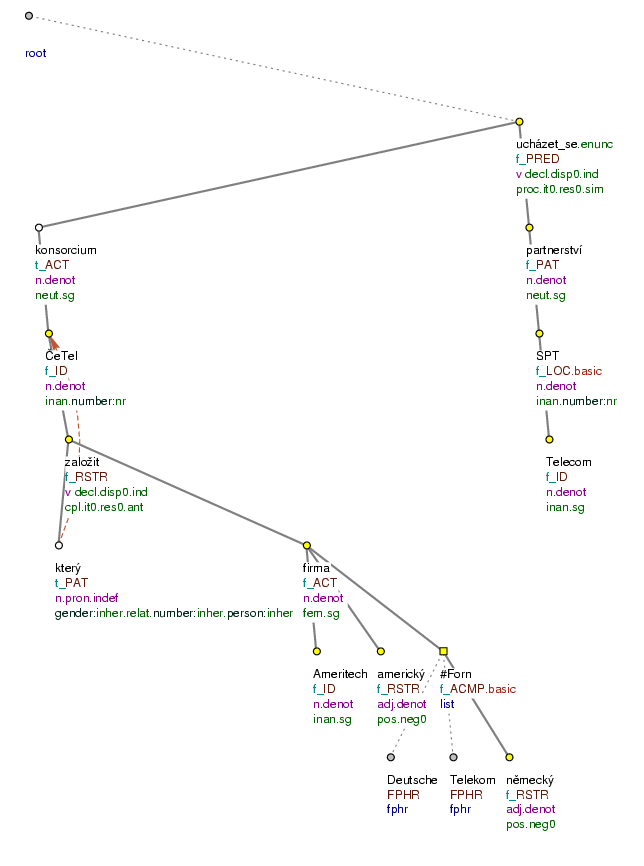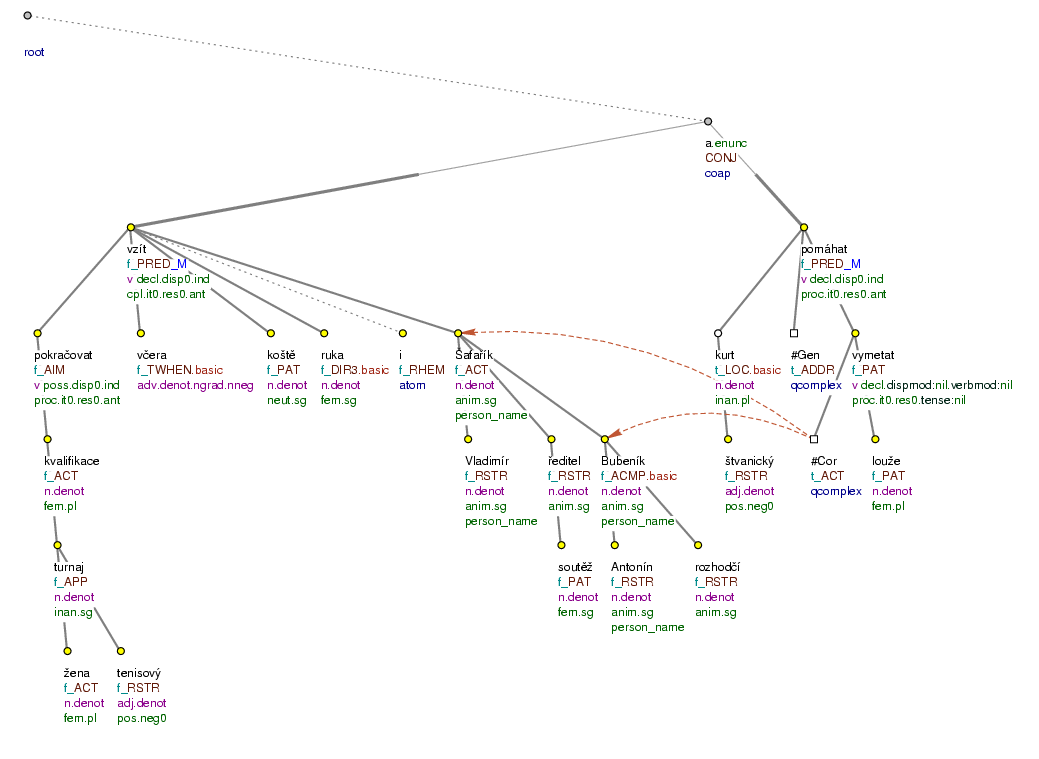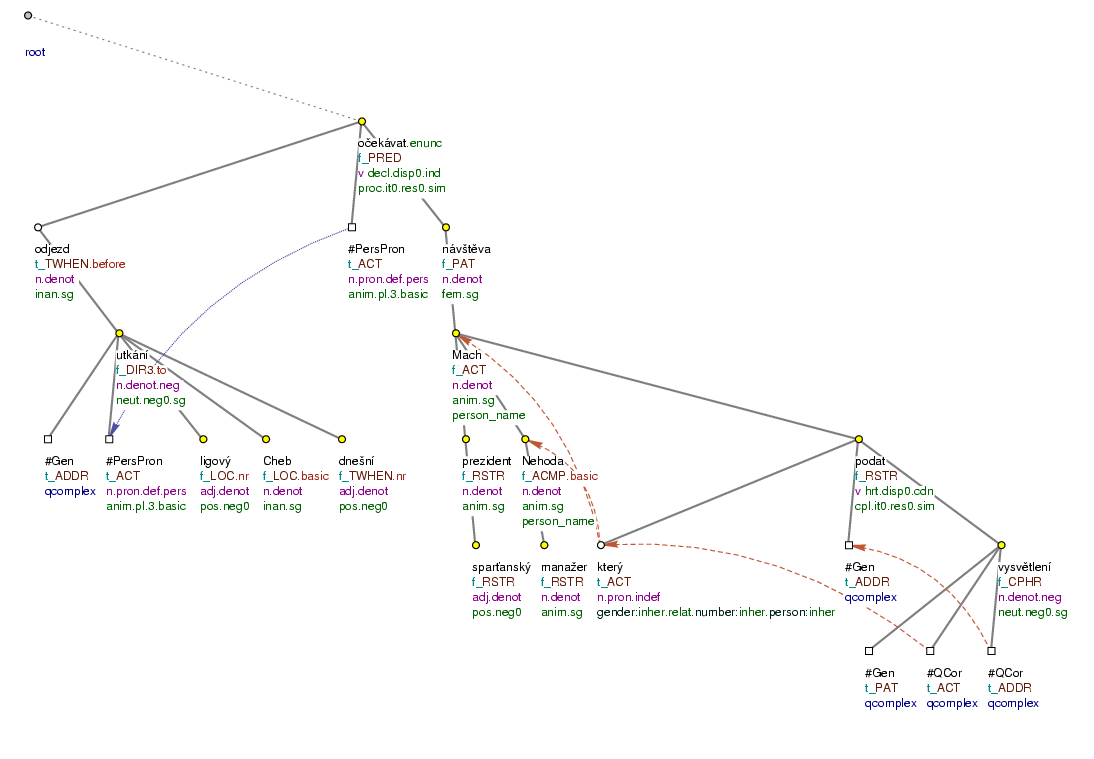In those cases when the coreferred node is a noun phrase with the so called nominative of identity (see Section 8, "Identifying expressions"), it is not the modification in the position of the nominative of identity (functor=ID) that enters into the coreference relation, but rather its governing noun.
An exception are cases in which the modification in the nominative of identity (unlike its governing node) agrees in morphological categories with the coreferring node. Then the node with the ID functor is taken to be the coreferred element. Cf.:
-
Konsorcium ČeTel, který založila americká firma Ameritech společně s německým Deutsche Telekom, se uchází o partnerství v SPT Telecom. (=lit. Consortium.neut ČeTel.masc, which.masc ...)
The relative pronoun který (=which) refers to Če Tel (the nominative of identity,
functor=ID), because they agree in morphological categories. Cf. Fig. 9.94.
If the coreferring node agrees both with the governing node and the nominative of identity, it is the governing node that is taken to be the coreferred node.
Figure 9.94. Referring to a modification with the ID functor

Konsorcium ČeTel, který založila americká firma Ameritech společně s německým Deutsche Telekom, se uchází o partnerství v SPT Telecom. (=lit. Consortium ČeTel, which.ACC founded American company.NOM Ameritech together with German Deutsche Telekom, REFL applies for partnership in SPT Telecom)
If the coreferred element is a group of nodes connected not in coordination but in a hypotactic form, by means of the preposition s+7 (the second node is dependent on the first one and has the ACMP functor), the coreference relation goes to both these nodes: the coref_text.rf attribute of the coreferring nodes contains the identifiers of both nodes. This only applies if the verb and the coreferring node are in plural.
Cf.:
-
Aby mohla pokračovat kvalifikace tenisového turnaje žen, vzali včera koště do ruky i ředitel soutěže Vladimír Šafařík s rozhodčím Antonínem Bubeníkem a na štvanických kurtech pomáhali{
#Cor.ACT} vymetat louže. (=... also the director Vladimír Šafařík with the referee Antonín Bubeník ... helped.pl...)The controlled Actor of the infinitive vymetat is controlled by the whole expression ředitel soutěže Vladimír Šafařík s rozhodčím Antonínem Bubeníkem. The
coref_text.rfattribute of the controlled subject (t_lemma=#Cor) contains the identifiers of both nodes: Šafařík as well as Bubeník. Cf. Fig. 9.95.
Another example:
Před odjezdem k dnešnímu ligovému utkání v Chebu očekávají návštěvu sparťanského prezidenta Macha s manažerem Nehodou, kteří by měli podat vysvětlení. (=... arrival of Sparta's president Mach with the manager Nehoda, which.pl...) Fig. 9.96
If there is no formal indication that the coreferring node refers to several nodes, there is only one coreferred node, i.e. the governing node of the noun phrase.
Figure 9.95. Referring to two nodes

Aby mohla pokračovat kvalifikace tenisového turnaje žen, vzali včera koště do ruky i ředitel soutěže Vladimír Šafařík s rozhodčím Antonínem Bubeníkem a na štvanických kurtech pomáhali vymetat louže. (=lit. So_that can continue qualification (of) tennis competition (of) women, took yesterday broom into hand also director (of) competition Vladimír Šafařík with referee Antonín Bubeník and on Štvanice courts helped sweep puddles)
Figure 9.96. Referring to two nodes

Před odjezdem k dnešnímu ligovému utkání v Chebu očekávají návštěvu sparťanského prezidenta Macha s manažerem Nehodou , kteří by měli podat vysvětlení. (=lit. Before departure for today's league match in Cheb expect visit (of) Sparta's president Mach with manager Nehoda which AUX should give explanation)
The pronoun ten does not enter into coreference relations in certain uses (positions). Except for the cases described in Section 3.2, "No textual coreference", the pronoun ten does not enter into coreference relations also in two more types of construction:
-
ten + relative clause;
-
ten + adjective.
!!! These are special cases; the reason for analyzing these cases without coreference is to keep the annotation throughout PDT as consistent as possible. All these solutions are only temporary and call for revision.
"Ten" + relative clause. In those constructions in which ten is a dependent node and, simultaneously, it governs a relative clause, no coreference is marked in the tree.
Example:
Srovnáme-li současný plán rozvoje dálniční sítě s tím, jaký byl přijat v roce 1991, výrazně se změnil. (=lit. If we compare the current plan ... with the one (lit. that) which was accepted in 1991...)
In principle, the relative clause could be taken to be the coreferred node. However, the relation between ten and the relative clause is already expressed by indicating the grammatical coreference of the relative pronoun (see Section 2.2, "Coreference with relative elements"); therefore, the information is not duplicated by marking the textual coreference as well.
"Ten" + adjective. In those constructions in which ten governs a dependent adjective, no coreference is marked in the tree.
Examples:
Je to možná tragedia dell' arte o nepřátelích, kteří jsou posedlí touhou být spolu, a dokonce být tím druhým. (=...that are obsessed with the desire to be together, and even to be the other one (lit. that other))
Propadají podobnému omylu jako Platon, který věděl, co není v pořádku, rozuměl tlakům či neštěstí, pod kterým lidé trpěli, zmýlil se však v tom základním, totiž že dokáže tento tlak zmenšit a obnovit štěstí lidí, pokud se mu je podaří přivést zpět ke kmenovému systému. (=...he was wrong in the basic thing (lit. that basic)...)
Na Pankráci bylo v letech 1943 -1945 popraveno celkem 1079 lidí. Sto třicet z nich bylo ocejchováno značku H - hospodářský delikt, 276 dostalo značku O, která znamenala, že hospodářský růst nebo vlastenecký delikt nepřipadá v úvahu. Myšlena tím byla potulka, individua práce se štítící a obyčejná kriminalita. A tahle individua a jejich potomci že dostanou prachy z našich daní? ozvou se hlasy na konci měsíce září, když parlament přijme zákon o odškodnění obětem nacismu. Političtí ano, kriminálníci ne! Řeknou ti umírnění. (=...the moderate ones (lit. that moderate) will say)
This is caused by the fact that in most cases, it is impossible to find the coreferred node, or it can be expressed by something like "lidé (=people)". The combination of ten and an adjective can be considered a single unit equivalent to a noun; i.e. ten druhý (=lit. that other) like druh (=partner), druhý člověk (=the other person), to základní (=lit. that basic) like základní věc (=the basic thing), základ (=the base), ti umírnění (=those moderate) like umírnění lidé (=the moderate people). In order to keep a certain degree of consistency, neither those cases in which it is possible to find the coreferred node are analyzed as involving coreference.